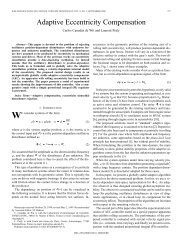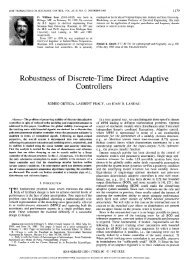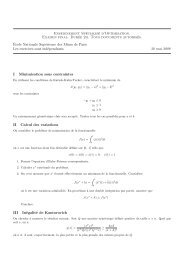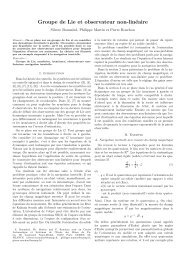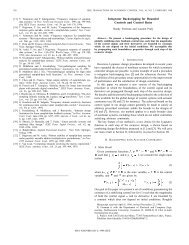HOMOGENEOUS OBSERVER DESIGN 1839From Corollary 2.22, the result holds for all L ∗ small enough to sat<strong>is</strong>fy c 1 L ∗ε ≤c G .6. Conclusion. We have presented two new tools that can be useful in nonlinearcontrol design. The first one <strong>is</strong> introduced to formalize the notion <strong>of</strong> homogeneousapproximation valid both at the origin and at infinity. With <strong>th<strong>is</strong></strong> formal<strong>is</strong>m we havegiven several novel results concerning asymptotic stability, robustness analys<strong>is</strong>, andalso finite time convergence (uniformly in the initial conditions). The second one <strong>is</strong>a new recursive design for an observer for a chain <strong>of</strong> integrators. The combination <strong>of</strong>these two tools allows us to obtain a new result on stabilization <strong>by</strong> output feedbackfor systems whose dominant homogeneous in the bi-limit part <strong>is</strong> a chain <strong>of</strong> integrators.Appendix A. Pro<strong>of</strong> <strong>of</strong> Proposition 2.10. We give the pro<strong>of</strong> only in the 0-limit case since the ∞-limit case <strong>is</strong> similar. Let C be an arbitrary compact subset <strong>of</strong>R n \{0} and ɛ any strictly positive real number. By the definition <strong>of</strong> homogeneity inthe 0-limit, there ex<strong>is</strong>ts λ 1 > 0 such that we have∣φ(λ r φ,0⋄ x)λ d φ,0− φ 0 (x)∣ ≤ 1 ∀ x ∈ C, ∀ λ ∈ (0,λ 1] .Hence, as φ 0 <strong>is</strong> a continuous function on R n , for all λ in (0,λ 1 ], the function x ↦→φ(λ r 0 ⋄ x)λ d φ,0takes its values in a compact set C φ = φ 0 (C) +B 1 , where B 1 <strong>is</strong> theunity ball.Now, as ζ 0 <strong>is</strong> continuous on the compact subset C φ , it <strong>is</strong> uniformly continuous;i.e., there ex<strong>is</strong>ts ν> 0 such that|z 1 − z 2 | < ν =⇒ |ζ 0 (z 1 ) − ζ 0 (z 2 )| < ɛ .Also there ex<strong>is</strong>ts µ ɛ > 0 sat<strong>is</strong>fyingζ(µ r ζ,0z)∣ µ d − ζζ,0 0 (z)∣ ≤ ɛ ∀ z ∈ C φ , ∀ µ ∈ (0,µ ɛ ] ,or equivalently, since d φ,0 > 0,ζ(λ d φ,0z)(− ζ∣0 (z)∣ ≤ ɛ ∀ z ∈ C φ , ∀ λ ∈ 0,µd φ,0 d ζ,0rλ ζ,0r ζ,0d φ,0ɛSimilarly, there ex<strong>is</strong>ts λ ν such thatφ(λ r φ,0⋄ x)∣ λ d − φφ,0 0 (x)∣ ≤ ν ∀ x ∈ C, ∀ λ ∈ (0,λ ν] .It follows that∣ ζ(φ(λ r φ,0⋄ x))∣∣∣∣ d∣ φ,0 d ζ,0− ζ 0 (φ 0 (x))rλ ζ,0∣ ≤ ζ(φ(λ r (φ,0⋄ x)) φ(λr φ,0) ∣ ⋄ x)∣∣∣d φ,0 d ζ,0− ζ 0rλ ζ,0λ d φ,0( +φ(λr∣ ζ φ,0)⋄ x)0λ d − ζφ,00 (φ 0 (x))∣{≤ 2 ɛ ∀ x ∈ C, ∀ λ ∈ min λ 1 ,λ ν ,µ].r ζ,0d φ,0ɛ}.Th<strong>is</strong> establ<strong>is</strong>hes homogeneity in the 0-limit <strong>of</strong> the function ζ ◦ φ.<strong>Copyright</strong> © <strong>by</strong> <strong>SIAM</strong>. <strong>Unauthorized</strong> <strong>reproduction</strong> <strong>of</strong> <strong>th<strong>is</strong></strong> <strong>article</strong> <strong>is</strong> prohibited.
1840 V. ANDRIEU, L. PRALY, AND A. ASTOLFIAppendix B. Pro<strong>of</strong> <strong>of</strong> Proposition 2.11. We give the pro<strong>of</strong> only in the 0-limit case since the ∞-limit case <strong>is</strong> similar. The function φ being a bijection, we canassume without loss <strong>of</strong> generality that it <strong>is</strong> a strictly increasing function (otherw<strong>is</strong>e wetake −φ). Th<strong>is</strong>, together with homogeneity in the 0-limit, implies that ϕ 0 <strong>is</strong> strictlypositive. Moreover, for each δ> 0, there ex<strong>is</strong>ts t 0 (δ) > 0 such that∣ φ(t) ∣∣∣∣ − ϕ 0 ≤ δ ∀ t ∈ (0,t 0 (δ)] .t d0By letting λ = φ(t), <strong>th<strong>is</strong></strong> givesϕ 0 − δ ≤λφ −1 (λ) d0 ≤ ϕ 0 + δ ∀ λ ∈ (0,φ(t 0 (δ))] , ∀ δ> 0 .Since for δ < ϕ 0 the term on the left <strong>is</strong> strictly positive, these inequalities give( 1) 1d 0ϕ 0 + δ≤ φ−1 (λ)λ 1d 01Then since the function δ ↦→ (ϕ ) 1d 00−δex<strong>is</strong>ts δ 1 (ɛ 1 ) > 0 sat<strong>is</strong>fying( 1ϕ 0) 1d 0− ɛ 1 ≤Th<strong>is</strong> yields(φ −1 (λ)∣λ 1d 0≤1ϕ 0 + δ 1 (ɛ 1 )( ) 11d 0∀ λ ∈ (0,φ −1 (t 0 (δ))], ∀ δ ∈ (0,ϕ 0 ) .ϕ 0 − δ) 1d 0<strong>is</strong> continuous at zero, for every ɛ 1 > 0 there≤(1ϕ 0 − δ 1 (ɛ 1 )) 1d 0( ) ∣11d 0 ∣∣∣∣− ≤ ɛ 1 ∀ λ ∈ (0,λ − (ɛ 1 )] ,ϕ 0with λ − (ɛ 1 )=φ(t 0 (δ 1 (ɛ 1 ))). With a similar argument, we getφ −1 ( ) ∣1(−λ) 1d 0 ∣∣∣∣ + ≤ ɛ 1 ∀ λ ∈ (0,λ + (ε 1 )]∣ d 0 ϕ 0λ 1for some λ + > 0. Let λ 0 = min{λ − ,λ + }.Now, for x ≠ 0 and λ> 0, we have∣φ −1 (λx)∣λ 1d 0( ) ∣1xd 0 ∣∣∣∣− = |x| 1d 0ϕ 0∣ ∣∣∣∣φ −1 (λx)(xλ) 1d 0≤( ) ∣11d 0 ∣∣∣∣− .ϕ 0Therefore, for any compact set C <strong>of</strong> R\{0} and any ɛ> 0, <strong>by</strong> letting ɛ 1 =we have|x| 1d 0 ɛ 1 ≤ ɛ, 0 < |λx| ≤ λ 0 (ɛ 1 ) ∀ λ ∈and thereforeφ −1 (λx)∣λ 1d 0( ) ∣1xd 0 ∣∣∣∣− ≤ ɛϕ 0∀ λ ∈(0,( 1ϕ 0) 1d 0+ ɛ 1 .ɛmax x∈C |x| 1d 0,]λ 0 (ɛ 1 ), ∀ x ∈ C,max x∈C |x|(]λ 0 (ɛ 1 )0,, ∀ x ∈ C.max x∈C |x|Th<strong>is</strong> establ<strong>is</strong>hes homogeneity in the 0-limit <strong>of</strong> the function φ −1 .<strong>Copyright</strong> © <strong>by</strong> <strong>SIAM</strong>. <strong>Unauthorized</strong> <strong>reproduction</strong> <strong>of</strong> <strong>th<strong>is</strong></strong> <strong>article</strong> <strong>is</strong> prohibited.
- Page 1 and 2: SIAM J. CONTROL OPTIM.Vol. 47, No.
- Page 3 and 4: 1816 V. ANDRIEU, L. PRALY, AND A. A
- Page 5 and 6: 1818 V. ANDRIEU, L. PRALY, AND A. A
- Page 7 and 8: 1820 V. ANDRIEU, L. PRALY, AND A. A
- Page 9 and 10: 1822 V. ANDRIEU, L. PRALY, AND A. A
- Page 11 and 12: 1824 V. ANDRIEU, L. PRALY, AND A. A
- Page 13 and 14: 1826 V. ANDRIEU, L. PRALY, AND A. A
- Page 15 and 16: 1828 V. ANDRIEU, L. PRALY, AND A. A
- Page 17 and 18: 1830 V. ANDRIEU, L. PRALY, AND A. A
- Page 19 and 20: 1832 V. ANDRIEU, L. PRALY, AND A. A
- Page 21 and 22: 1834 V. ANDRIEU, L. PRALY, AND A. A
- Page 23 and 24: 1836 V. ANDRIEU, L. PRALY, AND A. A
- Page 25: 1838 V. ANDRIEU, L. PRALY, AND A. A
- Page 29 and 30: 1842 V. ANDRIEU, L. PRALY, AND A. A
- Page 31 and 32: 1844 V. ANDRIEU, L. PRALY, AND A. A
- Page 33 and 34: 1846 V. ANDRIEU, L. PRALY, AND A. A
- Page 35 and 36: 1848 V. ANDRIEU, L. PRALY, AND A. A
- Page 37: 1850 V. ANDRIEU, L. PRALY, AND A. A




